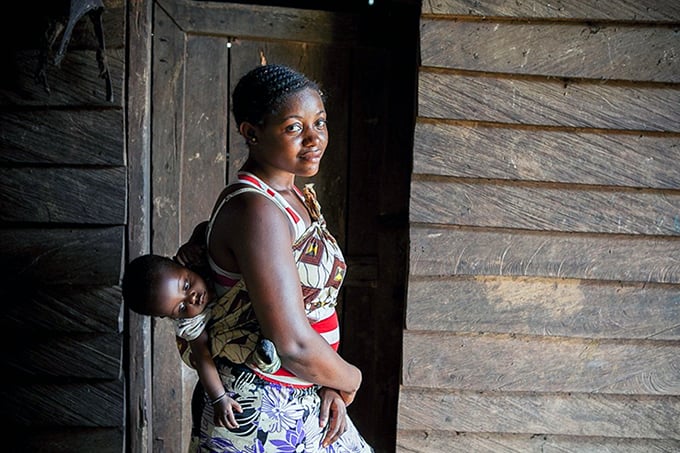
Photo: AMEI
New Partner: Greetings from the Adolescent Mothers’ Education Initiative Consortium
AMEI is implemented by World Vision UK in consortium with 5 partners: Initiative for Social and Economic Rights (ISER – Uganda), World Vision DRC, CONEPT DRC, World Vision Zimbabwe and ECOZI Zimbabwe.
The project is being delivered in DRC, Uganda and Zimbabwe and runs from 1 November 2021 – 30 October 2023.
The project
The overall objective of the project is to contribute to the continued education of pregnant girls and adolescent mothers in the Southern and East Africa regions.
It will employ the Social Accountability Citizen, Voice and Action (CVA) model at the local level as well as the Right to Education Index (RTEI) Research to support advocacy at the transnational level. CVA is World Vision’s local level advocacy methodology that aims to improve essential services (like health and education) by empowering communities to effectively and constructively engage, and advocate, with local authorities and policy makers around the realisation of their rights and entitlements as provided in national policies.
RTEI is a global monitoring and accountability initiative. It seeks to monitor compliance with the right to education, which is contained in at least 48 legal instruments, and covers key areas such as:
- Is the right to education guaranteed by the constitution and are policies in place?
- Have school fees been abolished?
- Are there enough classrooms, textbooks, and trained teachers?
- Is corporal punishment illegal?
- Does the law protect pregnant girls from being expelled?
- Are schools meeting the needs of children with disabilities?
It reveals areas in need of improvement, offers country-to-country comparisons, and tracks progress (or regression) over time. It seeks to strengthen civil society expertise and capacity, hold governments accountable to their commitments, and uphold the right to education.
The Objectives
- By the end of the project, key stakeholdres at the local level have more positive attitudes and behaviours towards, and have increased their support of, PGAM continuing their education.
- By the end of this project, development and implementation of key policies, plans and programmes is improved, and continued education of PGAM is included and prioritised at the national level.
- By the end of the project, regional and global development priorities and plans foster an enabling environment for supporting the continued education of pregnant girls and young mothers.
The Consortium
Our Partners and Us World Vision UK focus is on helping the most vulnerable children, in the most difficult places, overcome poverty and experience fullness in life. Inspired by our Christian faith, we help children – of all faiths and none – in some of the world’s most dangerous places.
We believe it takes a whole community to create happy and fulfilling childhoods. And we work together with communities, so they’re empowered to do just that.
ISER is an experienced not-for-profit human rights organisation, promoting Human Rights Based Approach in the design and implementation of legal and policy frameworks; strengthens community participation in the design and implementation of policies and programs affecting them; ensures government accountability through community empowerment; and builds CSO capacity for effective regional and international advocacy.
CONEPT is made up of 60 CSOs including Education Unions, Parents Associations, education and/or Children’s Rights NGOs, Journalists in Education, school coordinating bodies and researchers. CONEPT has campaigned: against sexual and gender-based violence against women and girls, and against violence among youths in urban areas; for the RTE; for quality education to end exclusion; and lifelong learning for youths and adults. CONEPT publications greatly contribute to the body of knowledge within DRC’s education sector.
WVDRC has contributed to the improved well-being of children through relief, advocacy and conflict-sensitive, gender-transformative, and disability-inclusive multi-sectoral development projects implemented across 13 of DRC’s 26 provinces. WVDRC’s Education Strategy prioritises increased access to education, improved quality of education, and improved school governance (contributing to SDG4). WVDRC adheres to the Inter-agency Network for Education in Emergencies (INEE) Minimum Standards.
ECOZI, has over 51 members and promotes education for all in Zimbabwe through coordinating civil society voice in education advocacy; and evidence-based advocacy for education policy formulation, implementation and review. ECOZI supported development of MoPSE’s 2016-2020 and 2021-25 Education Sector Strategic Plans (ESSP).
ECOZI campaigning: contributed to the development of the Performance-based Curriculum; integrated community voices in the stakeholder consultations for the 2019 Inclusive Education Policy, and the 2019 District and Provincial Operation Plans in Zimbabwe; and enhanced ECD enrolment and retention through improved school feeding programmes and provision of material needs. ECOZI research on Innovative Financing Models: contributed to the Education Amendment Bill; led to the development of a school financing policy; inclusive education; an early learning policy in Zimbabwe; and will provide the basis for the establishment of a funding mechanism for the State-Funded Basic Education Fund.
WVZ effectively mobilises actors, including children, to engage politicians; empowers communities to develop strategic external relationships; and raises awareness of, and mobilises support around RTE in communities. WVZ: leads the Education Sector in the ‘Heads of Agencies for INGOs’ group; is in the National Taskforce for the home-grown school feeding programme; a member of both the Gender and Disability, and Quality Education working groups; and sits on the SADC CSLT. It collaborates with the Ministry of Primary and Secondary Education (MoPSE) and is a member of ECOZI. WVZ and ECOZI were instrumental in the successful March 2021 Zimbabwe Education Act (N0:15) amendment. Both are members of the LEG and participate in JSRs.
For further information on the project please contact our Project Manager, Julian Baker; julian.baker@worldvision.org.uk
